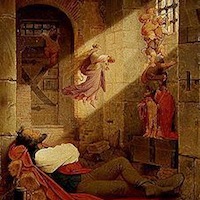 Since antiquity, but especially from the 18th century onwards, dreams have been considered as spaces of experience capable of offering an artistic source of inspiration and creativity. The topos of the dreamer as artist and, vice-versa, of the artist as a dreamer, manifested itself not only in the theoretical discourses of Romanticism and of subsequent generations of artists and writers. It also appears in numerous works of poetry, in paintings and the graphic arts. Jean Paul poignantly suggested that “The dream is an involuntary kind of poetry”, while visual artists such as Fuseli, Ingres or the Nazarenes drew on the dream metaphor to express their fascination for the process of artistic creation. In this context, dreaming emerges as a productive state of consciousness that enhances the imaginative capacity of the creative mind and renders it receptive to exterior stimulations of transcendental origin.
Since antiquity, but especially from the 18th century onwards, dreams have been considered as spaces of experience capable of offering an artistic source of inspiration and creativity. The topos of the dreamer as artist and, vice-versa, of the artist as a dreamer, manifested itself not only in the theoretical discourses of Romanticism and of subsequent generations of artists and writers. It also appears in numerous works of poetry, in paintings and the graphic arts. Jean Paul poignantly suggested that “The dream is an involuntary kind of poetry”, while visual artists such as Fuseli, Ingres or the Nazarenes drew on the dream metaphor to express their fascination for the process of artistic creation. In this context, dreaming emerges as a productive state of consciousness that enhances the imaginative capacity of the creative mind and renders it receptive to exterior stimulations of transcendental origin.
This conference aims at a reconstruction of the philosophical and artistic discourses surrounding the poetic and artistic potential of dreams, especially with a view to their historical as well as cultural particularities. It acknowledges, further, the need for context-specific case studies of artistic works in order to gain a differentiated picture of the functions and interpretations of the topos. It is only by bringing together analyses from such diverse fields as the visual arts and literature as well as music, theatre and film, that it becomes possible to specify the multiple references to other discourses of inspiration on the one hand and to traditional conventions of representation and narrative patterns on the other. This approach also critically interrogates the myth of the liberated modern artistic subject that, empowered by a sensual dream experience, is able to develop freely and unhindered by academic doctrine and rational criteria. While focusing on the 18th and 19th centuries, the conference also takes into consideration phenomena from earlier periods that throw into relief the period under discussion. Examples from the 20th and 21st centuries are also welcome, especially if they highlight the reception and evolution of the topos in more recent media.
Topics may include, but are not limited to:
- The dream as a metaphor for sensory insight and artistic productivity, unfolding beyond rational interpretations of reality
- Representations of dreams in the context of contemporary discourses of inspiration (e.g. the discourse of genius)
- Parallelisms of different dream concepts in artistic and poetic works (e.g. the recurrence of visionary aesthetics in the Romantic reception of the Middle Ages)
- Considerations on the creative process: Is there a correlation between the dream topic and the evolution of innovative pictorial language, narrative strategies, etc.?
- Historical dimension: Can the topos of the dreaming artist be considered as a specific phenomenon of the Enlightenment, of romanticism or of symbolism? How do subsequent generations of artists and writers (e.g. surrealism and informalism) react to this topos?
- Media-specific particularities concerning the topic’s representation and interpretation
In accordance with the interdisciplinary approach of the graduate school “European Dream-Cultures”, papers can be submitted by researchers (PhD candidates, postdoctoral researchers and habilitation candidates) from a wide range of disciplines such as art history, literature, history, philosophy, theatre, film and media studies, as well as musicology.
Please send a pdf-file containing an abstract of approximately 400 words, a curriculum vitae and a list of publications (if applicable) to Marlen Schneider (traumkulturen@uni-saarland.de) by March 31, 2016.
Papers should be limited to 20 minutes, and can be presented in either German or English. The publication of conference proceedings is planned.

Leave a Reply
You must be logged in to post a comment.